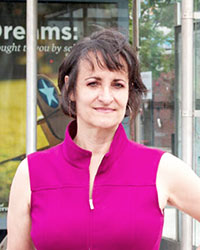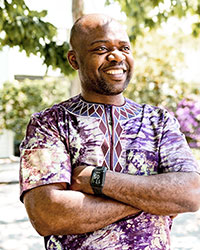By Fernando Cervantes Jr.
The Somerville Times put four questions of interest to the voters of Somerville to the last two remaining candidates running for Mayor of Somerville, Will Mbah and Katjana Ballantyne. The candidates’ answers are presented in alphabetical order, according to their last names. The questions and answers are as follows:

Katjana Ballantyne
Now that the field of candidates has been thinned out to just two, why should people that did not vote for you, do it on November 2?
Our next mayor must have three qualities to do the job we expect and deserve: a commitment to our values and culture, an inclusive leadership style based on transparency and engagement, and the proven experience to be the chief executive. I best bring those qualities to the mayor’s office.
My values-driven initiatives have made Somerville a national leader in combating climate change, increased affordable housing, access to jobs, and in protecting vulnerable communities.
My experience in business, non-profit community organizations, and in government, uniquely qualifies me to understand and align the incentives and strengths of all stakeholders to solve complex problems together.
My inclusive leadership has delivered results. I make sure that not only the voices of our many active residents are heard, but that we listen also to the voices of our neighbors who can’t always attend meetings. Often, the residents who are most affected by our policy choices face the greatest barriers to participation.
At this pivotal moment, I’m confident that with my leadership we can confront climate change, inequality, and the pandemic to create a city that works for all of our residents. I ask for your vote so that we can reach these goals together.
How can you help Somerville deal better with traffic, cycling and parking?
Eight out of ten cars using Somerville streets pass through our neighborhoods on their way to and from other communities. These drivers do not stop at local businesses or at a residence; they only make Somerville streets more congested, more polluted, and less safe.
As Mayor, I’ll keep working with the community to create a safe, complete network of shared streets for all who live, work and shop here. We will plan our streets to accommodate multiple transportation modes including bus and bike lanes, shared curbs, traffic calming, and hands-free pedestrian signals. These features will make moving around Somerville safer for everyone, including children, adults, and people with disabilities.
Somerville is poised to be a regional leader in transportation. Working together we can demonstrate that everyone can safely coexist with smarter planning and better streets.
Together with neighborhoods, we have made some important and highly visible improvements, but there is much more to do.
As mayor, we will continue to improve local transit options by working for better local bus and shuttle services. These shared mobility options will help to make local transportation more affordable, limiting our dependence on fossil fuel use, thereby improving sustainability, and economic and environmental equity.
What are some proposals that you are planning to bring to the table in terms of police reform in Somerville?
The foremost priority in public safety is to serve Somerville’s needs. We need to provide appropriate mental health and abuse recovery services as alternatives to arrest, training in de-escalation techniques, and enhanced accountability–especially for issues of systemic racism and implicit bias.
To make fundamental changes, we need to focus on goals. I support the 10-point plan, proposed last year by Congresswoman Ayanna Pressley and a broad coalition of Massachusetts elected officials of color. The plan provides an ambitious but achievable roadmap for improving training and disciplinary procedures and reducing confrontational or abusive tactics.
I’ve committed; to establishing civilian oversight, supporting our new Racial & Social Justice department and its new staff, using data and best practices, having community input to find the right approach for Somerville, and to include our most vulnerable communities who often face the greatest barriers to participation.
We must push for greater diversity in the police force. Other improvements include ensuring that officers are licensed under Peace Officer Standards and Training protocols, establishing a full curriculum of training and refresher courses in implicit bias, de-escalation, crisis intervention, and health and mental wellness. I am committed to making changes to public safety that will best serve the needs and safety of Somerville.
Do you support rent control and how would you plan to establish rent control?
Right now we can’t even have the conversation, because state law doesn’t allow it. We need to be able to have that conversation. We must use every municipal tool available to address affordability, and the urgency of our time, including rent stabilization.
As for the policy, there are many ways to go about any kind of rent control or rent stabilization programs. If the state lifts the ban, then we need to move forward on the affordable housing discussion. We have to have to: make sure owners and renters are at the table together discussing our approach to affordable housing, and how it will strengthen our communities, and building on continuity. This is ultimately what is going to make Somerville more affordable and more appealing.
I am committed to working together to make Somerville a leader on rent stabilization.
Wilfred N. Mbah

Now that the field of candidates has been thinned out to just two, why should people that did not vote for you, do it on November 2?
Voters should know that I will always put their needs first, regardless of if they voted for me or not. I ran for office in 2017 because I saw that our city government was not addressing the needs of working-class families and marginalized communities. It frustrated me to see the city put the needs of special interests and developers from outside of the city ahead of the needs of families that have lived here for generations. This is why I have never accepted money from developers, and I am the only candidate in this race that can say that. Voters can be reassured that I will always put their needs ahead of the needs of special interests, because that’s what I’ve done during my time on the city council.
The final reason I think voters who didn’t vote for me originally, should consider it on November 2 is my ability to bring people together and bridge gaps. If you look at my testimonials and endorsements (as well as my time on the city council) you will notice that people cite my willingness to listen and find ways to bring together residents who have lived in Somerville their whole lives with those who might have only recently moved to Somerville. I truly listen to people, regardless of whether or not I received their vote.
You have also talked about free public transportation in Somerville but public transportation is run by the MBTA. How do you propose to provide free public transportation in Somerville?
Public transportation should be available to all, not just those who can afford it. We do not charge people to attend public schools, use a public library, or go to a public park, and we should aim to make it free for people to use public transportation. This will take time, collaboration with regional partners and the MBTA, but we can start to take the steps that will take us down the path of free public transportation. It is not overambitious or unrealistic to make busses fare free in Somerville. We are already seeing this in Boston where pilot programs have established fare free bus routes. As Mayor, I will advocate for the MBTA to introduce similar pilot programs in Somerville that make bus routes like the 89 or 101 fare free.
This can be funded through the combination of a variety of revenue sources. First, in Olympia, Washington, the city was able to cut down on the cost of plastic fare cards, which were becoming expensive due to tariffs imposed by the Trump administration, by going fare free. In many cities, the cost of the fare card combined with the cost of processing the fare can be more expensive than the fare itself. Second, cities that have eliminated fares for busses have seen an increase in ridership as a result. This would allow the MBTA to charge more for advertising on busses and bus stops. Another way to provide free transportation is to subsidize fares for low income and working-class families that rely on public transportation. I will advocate for this and collaborate with our regional partners to push the MBTA to make public transportation free and accessible for everyone.
What are some proposals that you are planning to bring to the table in terms of police reform in Somerville?
As a person of color, the father of two black children, and an immigrant, this issue is deeply personal to me. Some of the problems with our current system of policing is the result of tasking policing officers with jobs that they are not equipped to handle. This can often result in the unnecessary escalation of incidents they are called to and have dire consequences. We should not be sending someone with a gun to address calls that involve the unhoused, addiction, and mental health. These issues can be best handled by professionals with backgrounds in public health, not police. Cities that have taken this approach have saved money by cutting down on the costs associated with arresting individuals and improving public health outcomes by addressing the root problems of houselessness, addiction, and mental health.
We also need to implement the Civilian Oversight Board and ensure it has the resources necessary to serve as another layer of oversight and protection for residents of Somerville in instances of police misconduct.
Police officers should be representative of the communities that they are charged with protecting. We need to have more officers of color in senior positions of the police force so that we have leaders with different backgrounds and experiences. This will lead to better decision making among our police force’s leadership and give the police force a perspective it has been missing for decades.
Do you support rent control and how would you plan to establish rent control?
I support rent control and as mayor would advocate from the office of the mayor for our state legislature to make rent control legal and plan on collaborating with our city’s state representative to facilitate the implementation of rent control. One of my first actions as mayor will be to hold a rent control summit with regional partners and community groups where we will build a strategy for getting rent control brought back to Massachusetts.















Reader Comments